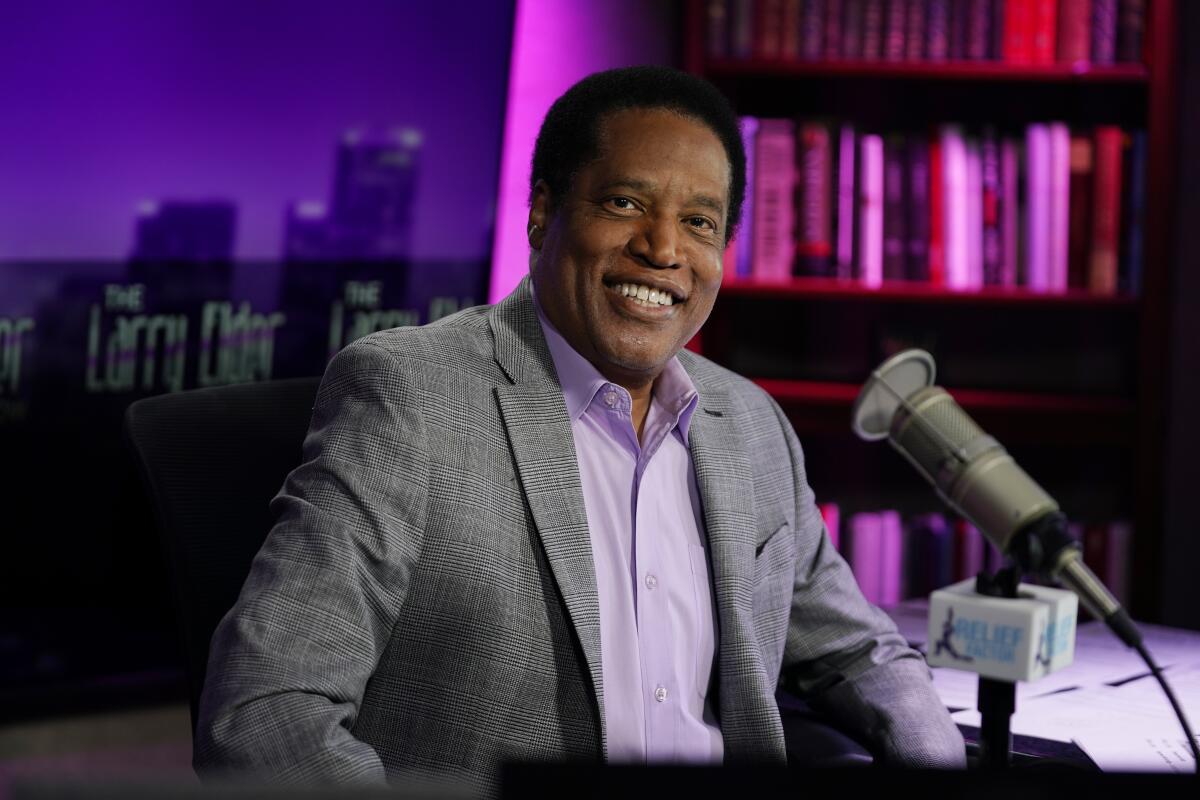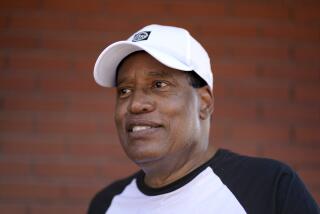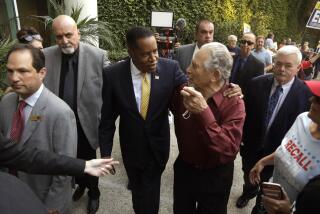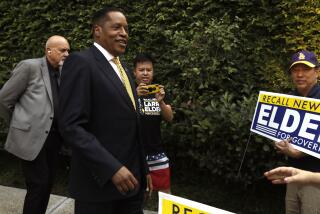Larry Elder was right to protest California’s punitive tax return requirement for candidates

- Share via
We can think of a number of reasons that radio host Larry Elder shouldn’t become governor of California on Sept. 14, starting with the fact that Gov. Gavin Newsom doesn’t deserve to be recalled. But none of those reasons include Elder’s failure to properly redact personal information on some of the more than 300 pages of tax records he submitted — on time — with the secretary of state’s office last week.
The fact that Secretary of State Shirley Weber disqualified Elder from the ranks of certified gubernatorial recall candidates based on an apparently minor paperwork infraction is wildly improper. The law clearly states that if a candidate bungles redaction in the tax return documents intended for public consumption, the solution is for elections officials to consult the unredacted version to fix the omission — not to block that person from the ballot altogether. In any case, a judge ruled on Wednesday that Weber must include Elder on the recall ballot, saying that not only did he “substantially” comply with the tax return requirement, he didn’t have to file the documents in the first place because the law applies only to primary elections.
This dispute may have been resolved quickly and fairly, but the fact that Elder had to sue to force state elections officials to do the right thing is troubling. It is also a potent reminder that the tax return requirement was problematic long before Elder ran afoul of it.
Though billed as a service to voters, the Presidential Tax Transparency and Accountability Act of 2019 was passed out of spite by legislative Democrats angry at then-President Trump for failing to release his tax returns during the 2016 presidential race, as is the modern custom. The law bars candidates for president and governor from appearing on a state primary ballot unless they turn in five years of tax records, which are then posted in redacted form for public perusal. But the new law’s constitutionality was challenged, and the California Supreme Court ultimately ruled that California could not impose extra requirements on presidential candidates. So much for sticking it to Trump.
But the requirement for gubernatorial candidates — included in the original bill, we suspect, to give cover to Democrats who denied that the legislation was a partisan attack on Trump — remains. The Sept. 14 recall election is the first time this requirement has been imposed on candidates. It should be the last.
Yes, presidential and gubernatorial candidates should disclose their tax returns to help voters fully assess their backgrounds and any conflicts of interest, real or perceived. But it is wrong to make it a prerequisite to run for public office, lest it encourage partisans to apply ever more restrictive requirements in an effort to stop political foes. That was the reason Gov. Jerry Brown gave for vetoing an earlier version of the law in 2017. What Brown probably didn’t envision was that it also might trip up people who did their best to comply in good faith and even elections officials themselves.
If the requirement is difficult for a well-resourced candidate like Elder, who has lawyers and accountants to consult, imagine the pitfalls awaiting people who don’t. Indeed, the secretary of state’s office says that several other hopeful recall candidates were disqualified due to bad tax return paperwork as well.
That the law is inherently flawed is not Weber’s fault. But if we have to live with this troublesome requirement, it is her job to make sure that it isn’t used to obstruct ballot access. There are plenty of reasons to reject Elder’s candidacy for governor; excessive redaction on one of two sets of tax returns he filed with the state should not be one of them.
More to Read
A cure for the common opinion
Get thought-provoking perspectives with our weekly newsletter.
You may occasionally receive promotional content from the Los Angeles Times.









